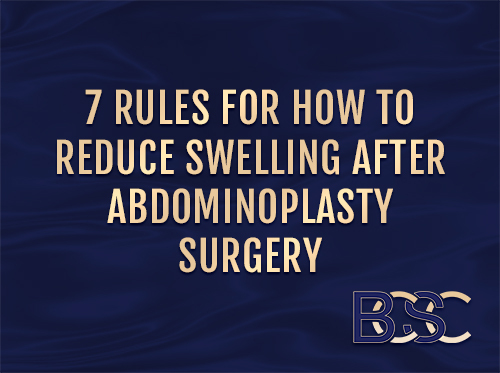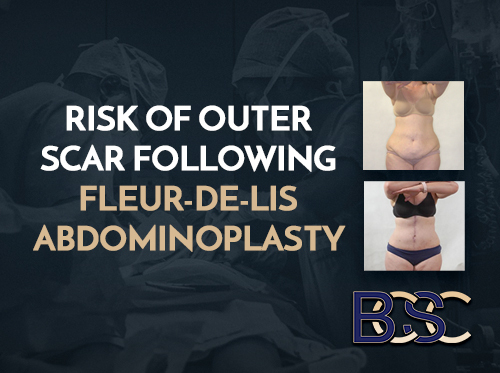Role of Nutrition and Exercise Post-Abdominoplasty
The period following surgery is crucial for proper healing, maintaining surgical results, and overall health. Nutrition and exercise are vital components of this recovery process after abdominoplasty (tummy tuck) as they support tissue healing, prevent complications, aid recovery, and promote long-term well-being.
This article explores the importance of nutrition and exercise in post-abdominoplasty care, offering advice and tips to help individuals effectively navigate their recovery and achieve lasting benefits.
Pre-Operative Role of Exercise and Nutrition Before Abdominoplasty Surgery
Before getting abdominoplasty surgery, it is essential to concentrate on exercise and a proper tummy tuck (abdominoplasty) diet, as it can significantly affect the procedure’s results and the healing process. This period before the surgery is essential for preparing the body and reduce any possible complications.
Muscle Strengthening
Before undergoing abdominoplasty surgery, it is essential to participate in specific exercises that focus on strengthening the core muscles. Having strong abdominal muscles not only provides better support for the surgical area but also aids in the recovery process.
Weight Management
It is essential to maintain a healthy weight before getting abdominoplasty for various reasons:
- Lowered Surgical Risks: Being at a healthy weight decreases the chances of complications during surgery, like excessive bleeding, slow wound healing, and infections.
- Better Aesthetic Results: Extra weight can affect the outcome of abdominoplasty by causing excess skin or unsatisfactory contouring.
- Recovery: Maintaining a healthy weight supports overall health, promoting a more efficient and speedy recovery after surgery.
To manage weight effectively before surgery, it is essential to maintain a balanced diet by consuming nutrient-rich foods like lean protein, raw fruits, vegetables, whole grains, and healthy fats. Avoiding processed foods, sugary drinks, and high-calorie snacks is also essential.
Patients should incorporate regular exercise into their routine, such as cardiovascular workouts, strength training, and flexibility exercises, to support weight management and overall fitness. More importantly, individuals should consult with healthcare professionals such as general surgeons or nutritionists to discuss weight management goals and develop a personalised plan for success.
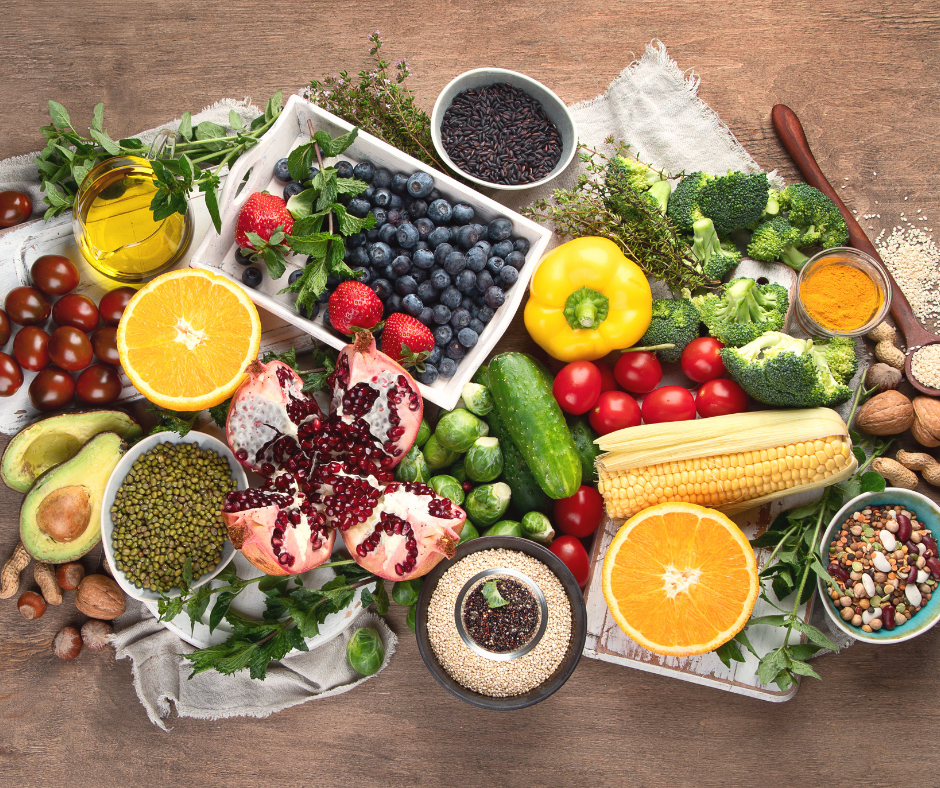
Health benefits of fresh fruits and whole grains
Nutrition
Proper nutrition is essential as it prepares the body for abdominoplasty surgery and promotes optimal healing. Important nutritional factors to consider include:
- Getting enough protein: Protein is crucial for tissue repair and recovery, so patients should make sure they are consuming adequate amounts from sources like poultry, fish, legumes, low-fat dairy, and tofu. According to Aesthetic Surgery Journal, “pretreatment protein supplementation is an ** intervention that can significantly decrease wound healing complications in post-bariatric surgery massive weight loss patients undergoing abdominoplasty.”
- Taking vitamins and mineral supplements: Healthcare providers may suggest supplements to treat any deficiencies and support a patient’s overall health. *NOTE: always check with your surgeon first before beginning a vitamin regimen, as some supplements are not permissible before surgery.
- Eating a balanced diet: Include a variety of fruits, vegetables, whole grains, and healthy fats in meals to get essential nutrients and promote overall health. It is important to work towards healthy habits.
- Avoiding crash diets: Steer clear of extreme or crash diets before surgery, as they can negatively affect your nutritional status and recovery outcomes.
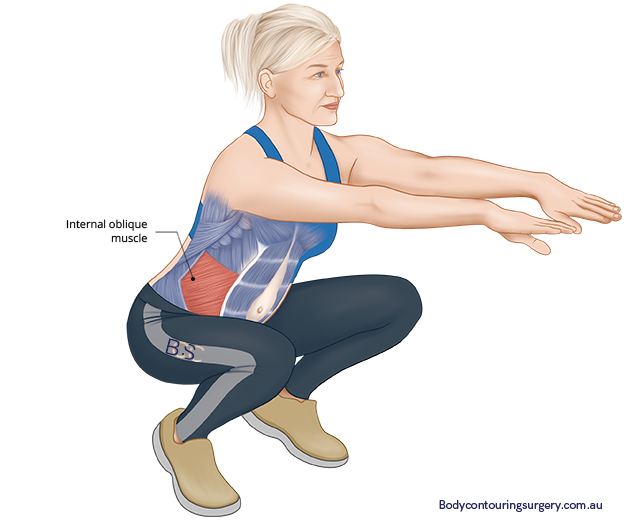
Post-Operative Role of Exercise and Nutrition Following Abdominoplasty
Following abdominoplasty surgery, the focus shifts to post-operative care, including exercise and nutrition, which are crucial for optimal healing, recovery, and long-term results. Here is an in-depth look at the post-operative role of exercise and nutrition after abdominoplasty surgery:
Exercise Following Abdominoplasty Surgery
It is essential to slowly ease back into an exercise regimen with guidance from healthcare professionals, focusing on core-strengthening exercises and avoiding strenuous activities. Patients should follow their surgeon’s advice, pay attention to their bodies, and adjust the intensity of their workouts as needed to ensure a successful recovery.
While all patients’ recovery processes vary, there are some general guidelines for post-abdominoplasty exercises aimed at aiding healing.
Early Mobilisation
After undergoing abdominoplasty, it is vital to have a well-planned strategy for movement to avoid complications and aid in the healing process. Engaging in activities early in the process, such as light walking, performing exercises that promote flexibility, and using correct posture, is essential for mobilisation. These practices help promote a successful recovery and reduce stress on the surgical site.
Starting slow movements under the surgeon’s guidance can prevent issues like blood clots, increase circulation, and aid healing.
Deep Breathing Exercises
Deep breathing exercises help increase lung capacity, boost oxygen levels, and support respiratory health during recovery.
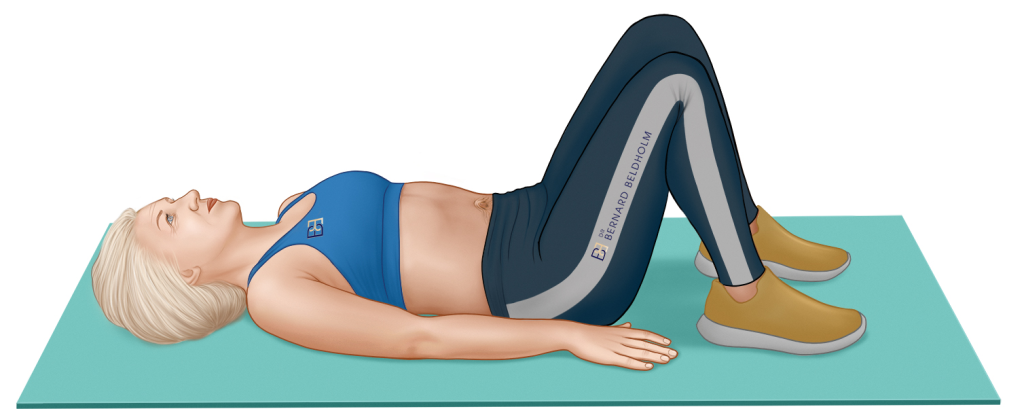
Gradually resume regular exercise routine at a slow pace to facilitate healing and maintain optimal results
Pelvic Tilts
These exercises engage core muscles, increase stability, and gradually strengthen the abdominal area. You can combine this exercise with sit ups.
Leg Raises
Controlled leg raises build leg muscle strength and promote circulation to reduce the risks of blood clots.
Kegel Exercises
Targeting pelvic floor muscles can help with bladder control and core stability after surgery.
Upper Body Stretching
Upper body stretches maintain flexibility, reduce muscle tension, and aid in overall mobility.
Light Cardiovascular Exercises
Low-impact activities like walking or stationary cycling improve cardiovascular health without straining the surgical site.
Avoid Heavy Lifting and High-impact Activities
It is vital to avoid strenuous activities like heavy lifting or high-impact exercises in the initial recovery phase to prevent complications and facilitate proper healing.
Pro Tip: Always consult your surgeon before starting any exercise regimen after abdominoplasty surgery. They can provide personalised recommendations based on your specific surgical procedure and individual healing progress. In addition, it’s essential to listen to your body and proceed with caution, gradually increasing the intensity and duration of exercises.
Nutrition Following Abdominoplasty Surgery
Proper nutrition is crucial for the healing process. The body requires specific nutrients to repair tissues, decrease inflammation, and facilitate overall recovery. Avoiding processed foods, sugary snacks, and proper foods high in saturated fats may help reduce inflammation and aid recovery.
Eating balanced meals throughout the day helps maintain consistent energy levels and promotes the body’s healing mechanisms. Seeking advice from healthcare professionals like registered dietitians can assist in creating personalised nutrition.
A clinical study by NCBI states, “…the prevalence of malnutrition in hospitalised patients is almost 40%-60%. It has been seen that increased risk for healthcare-associated infections is associated with the poor nutritional status of the patients. Nutritional screening identifies patients at nutritional risk and will benefit from further nutritional assessment and intervention.”
After undergoing abdominoplasty, patients must follow a balanced and nutritious diet to support their recovery and overall health.
According to a study by Plastic and Reconstructive Surgery, “…although the optimal nutrient intake to promote wound healing is unknown, it is clear that proteins, vitamin A, vitamin C, vitamin B complex, arginine, glutamine, iron, zinc, and selenium can have significant beneficial effects on wound healing and optimisation of the immune system.”
Nutritional Guidelines for Post-Abdominoplasty Patients
Stay Hydrated
Essential for cell function, detoxification, and overall health, staying adequately hydrated is extremely important during the recovery period following an abdominoplasty, as it supports healing and overall health. Though drinking eight to ten glasses of water each day is generally recommended, the amount of water needed daily varies depending on age, gender, activity level, climate, and health status.
Focus on Protein
Adequate protein consumption is significant as proteins are essential for tissue repair. Including sources of lean meats, eggs, dairy products, legumes, and plant-based proteins in the diet can support ongoing tissue healing.
Incorporate Fruits and Vegetables
Eat various colourful fruits and vegetables for essential vitamins, minerals, antioxidants, and fibre. These nutrients help support the immune system, reduce inflammation, and promote good health.
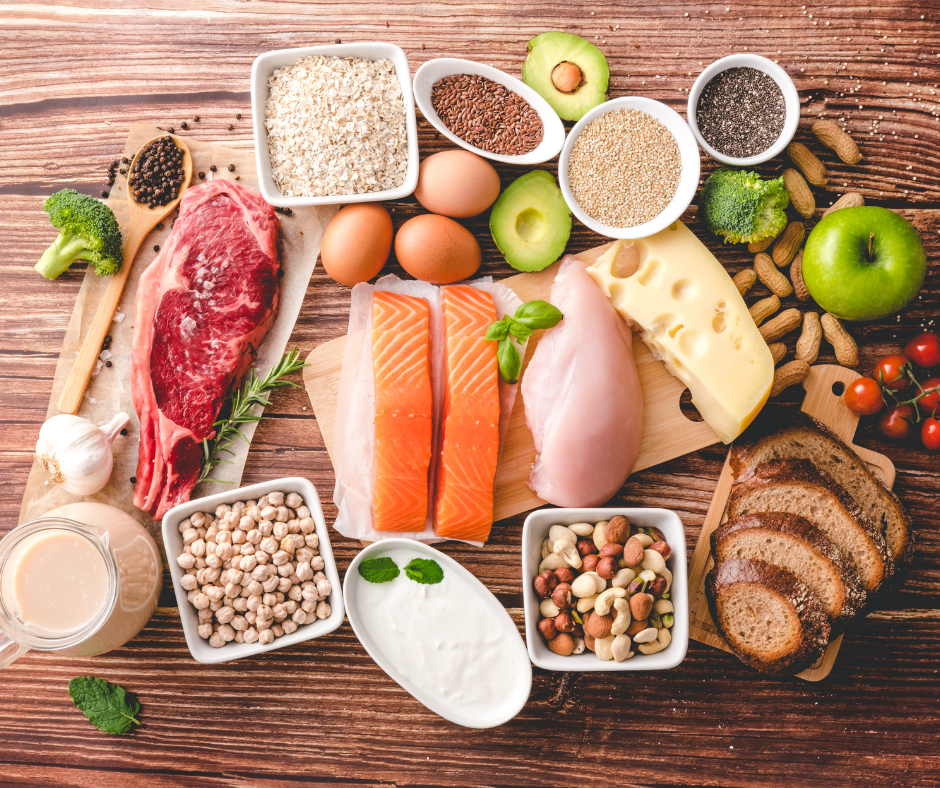
Choose Healthy Fats
Opt for healthy fats from foods like avocados, nuts, seeds, olive oil, and fatty fish such as salmon. Healthy fats are good for heart health, provide lasting energy, and help with nutrient absorption.
Include Whole Grains
Add whole grains like brown rice, quinoa, whole wheat bread, and oats to meals. Whole grains offer complex carbohydrates, fibre, vitamins, and minerals vital for energy and digestion.
Limit Processed Foods and Added Sugar
Cut back on processed foods, sugary snacks, desserts, and drinks with added sugars. These items can lead to inflammation, weight gain, and slower healing.
Eat Small Meals Throughout the Day
Have balanced meals at regular intervals to maintain steady energy levels, aid digestion, and prevent overeating. Each meal should include protein shakes, lots of veggies, and a source of healthy fats. However, it is important to avoid consuming excess fat products and adopt healthy eating habits.
Follow Your Surgeon’s Guidelines
Stick to the dietary advice given by the surgeon or healthcare team. Patients should follow specific instructions about what to eat or avoid to maximise their recovery process.
Consider Supplements
Most healthcare providers recommend supplements like vitamin D, calcium, omega-3 fatty acids, or multivitamins to compensate for any nutritional deficiencies and support overall health.
Listen to Your Body
Pay attention to signals your body gives you, such as hunger pangs, energy levels, discomfort, etc. Adjust your diet accordingly and seek medical advice if needed.
Patience and Consistency
Patience and consistency are also essential factors during the recovery period after abdominoplasty surgery. Patients must realise that healing takes time and cannot be rushed. Adherence to postoperative nutrition and exercise guidelines is vital for a successful recovery.
Pay attention to how your body feels, avoid pushing yourself too hard, and rest when necessary. By being patient and sticking to the recommended protocols, individuals can assist their bodies in healing properly, reduce potential complications, and attain lasting results from abdominoplasty surgery.
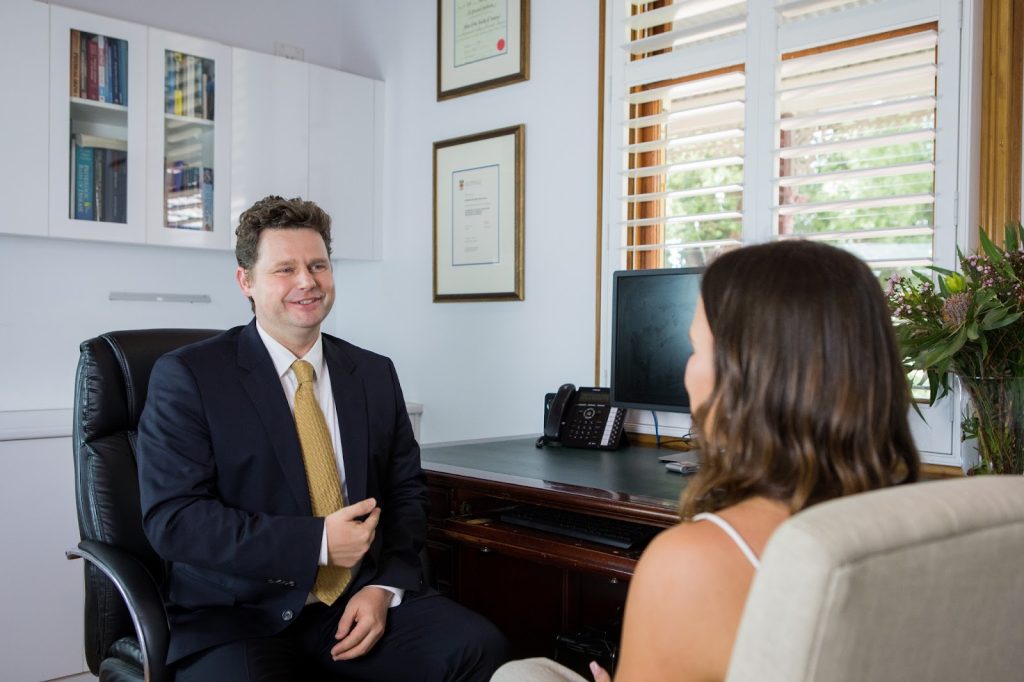
Dr Beldholm seeing patient
Consultation with Healthcare Professionals
Seeking advice from medical experts such as surgeons, dietitians, and physical therapists is crucial for receiving individualised support, regular monitoring, and specific treatments to aid rehabilitation. Patients are advised to keep in touch and attend follow-up visits for complete post-surgery care.
Conclusion
Proper nutrition and exercise are essential for a successful recovery after abdominoplasty. Following a balanced diet, staying hydrated, and adhering to prescribed workout routines can speed healing, reduce complications, and improve long-term outcomes. Patients should focus on their health and commit to a comprehensive recovery plan for a smoother healing process. For tailored, professional advice, book an appointment with Dr. Bernard Beldholm today. With offices conveniently located on Belmore Road in Lorn NSW, Dr. Beldholm and his team will guide you from the consultation to recovery and beyond.
References
- West, M., Wischmeyer, P. E., & Grocott, M. P. (2017). Prehabilitation and nutritional support to improve perioperative outcomes. Current Anesthesiology Reports, 7(4), 340–349.
- Toninello, P., Montanari, A., Bassetto, F., Vindigni, V., & Paoli, A. (2021). Nutritional Support for Bariatric Surgery Patients: The Skin beyond the Fat. Nutrients, 13(5), 1565.
- Austin, R. E., Lista, F., Khan, A., & Ahmad, J. (2016). The Impact of Protein Nutritional Supplementation for Massive Weight Loss Patients Undergoing Abdominoplasty. Aesthetic Surgery Journal, 36(2), 204-210.
- Bhattacharyya, A., Ramamoorthy, L., & Pottakkat, B. (2021). Effect of Pre-operative Nutritional Protocol Implementation on Postoperative Outcomes Following Gastrointestinal Surgeries: A RandomisedRandomized Clinical Trial. Journal of caring sciences, 10(4), 177–183.
- Makaryus, R., Miller, T., & Gan, T. (2018). Current concepts of fluid management in enhanced recovery pathways. British Journal of Anaesthesia, 120(2), 376-383.
- Agha-Mohammadi, S., & Hurwitz, D. J. (2008). Potential impacts of nutritional deficiency of post bariatricpostbariatric patients on body contouring surgery. Plastic and Reconstructive Surgery, 122(6), 1901–1914.
- Shankar, P.; Boylan, M.; Sriram, K. Micronutrient deficiencies after bariatric surgery. Nutrition 2010, 26, 1031–1037.
- Harris, L., & Darby, P. (2020). Enhanced Recovery after Abdominoplasty Using Perisurgical Nutritional Supplementation. Plastic and reconstructive surgery. Global open, 8(12), e3314.
- Kim, H. O., Kang, M., Lee, S. R., Jung, K. U., Kim, H., & Chun, H. K. (2018). Patient-Controlled Nutrition After Abdominal Surgery: Novel Concept Contrary to Surgical Dogma. Annals of coloproctology, 34(5), 253–258.
- Vidal, P., Berner, J. E., & Will, P. A. (2017). Managing Complications in Abdominoplasty: A Literature Review. Archives of plastic surgery, 44(5), 457–468.
- Quilliot, D., Coupaye, M., Ciangura, C., Czernichow, S., Sallé, A., Gaborit, B., Alligier, M., Nguyen-Thi, P., Dargent, J., Msika, S., & Brunaud, L. (2021). Recommendations for nutritional care after bariatric surgery: Recommendations for best practice and SOFFCO-MM/AFERO/SFNCM/expert consensus. Journal of Visceral Surgery, 158(1), 51-61.
